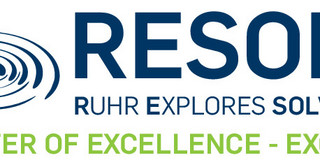New Collaboration between the Cluster of Excellence RESOLV and the Swiss Research Center MUST
- Research
- Top News
- Press Releases

The Bochum–Dortmund Cluster of Excellence RESOLV collaborates with the Swiss National Center of Competence in Research MUST. The new fellowship program supports 50 postdoctoral researchers in several locations in Germany and Switzerland.
A new fellowship program for postdoctoral researchers is created through a collaboration between two interdisciplinary research networks: the Swiss National Center of Competence in Research “Molecular Ultrafast Science and Technology” (NCCR-MUST) and the Bochum–Dortmund Cluster of Excellence “Ruhr Explores Solvation” (RESOLV). The transnational collaboration comprises 50 research groups from the fields of chemistry, physics, materials science, engineering and biology. The European Union supports the fellowship program with 3.54 million euros under the Horizon 2020 program as a Marie-Skłodowska-Curie COFUND Action.
The program, which starts in April 2019 and runs until September 2023, is called “Resolving Solvation with Molecular Ultrafast Science and Technology”, FP-RESOMUS in short. Its aim is to answer interdisciplinary questions at the interface of research on solvents and ultrafast processes using both simulation methods and the latest experimental technologies. The members of the program benefit from the complementary expertise in the respective networks.
Program in Germany and Switzerland
FP-RESOMUS supports 50 postdoctoral researchers in several locations in Germany and Switzerland. They investigate on a microscopic level how solvents influence various phenomena in nature and technology, and how ultrafast processes take place and can be improved.
The fellowship program addresses early career researchers who are currently working outside of Germany and Switzerland, or who have recently started working there. FP-RESOMUS gives them the opportunity to gain experience in different locations. They benefit from extensive training opportunities, especially in scientific methods, but also in soft skills like application methodology, project management, languages and writing courses.
About the COFUND program
With the Marie-Skłodowska-Curie COFUND Actions the European Commission supports both existing and new training and career-development programs for early career and experienced researchers. This helps the researchers to find their way to scientific independence. Regional as well as national and international fellowship programs for postdocs or doctoral researchers are co-funded by this program.
About RESOLV
The German Cluster of Excellence RESOLV consists of more than 200 scientists at six locations in the Ruhr area. The federal government and the federal states have funded the Cluster of Excellence as part of the Excellence Strategy – formerly the Excellence Initiative – since 2012.
The network investigates how solvents are involved in the mediation and control of chemical reactions. Most chemical reactions, important industrial processes and almost all biological processes take place in the liquid phase, with the solvents having an important role. Professor Martina Havenith from the Bochum Department of Physical Chemistry II is the speaker of the cluster.
About NCCR MUST in Switzerland
The Swiss National Center of Competence in Research “MUST” is a multidisciplinary network with more than 150 researchers at seven locations throughout Switzerland. It has been funded by the Swiss National Science Foundation since 2010. In this network, ultrafast processes in nature are investigated using laser technology, spectroscopy and simulation methods. Research questions include how photosynthesis, solar cells, the storage of data, electron transport and chemical reactions work at the molecular level and at very short timescales – and how such processes can be improved. Professor Ursula Keller (ETH Zurich) and Professor Thomas Feurer (Universität Bern) lead the network.




![[Translate to English:] Partner Four hands are holding the green logo of TU Dortmund University](/storages/tu_website/_processed_/1/d/csm_Partner_Nicole_Rechmann_KW_40b35bb3fd.jpg)




![[Translate to English:] Forschung An apparatus with tubes in a laboratory](/storages/tu_website/_processed_/0/c/csm_Forschung_Juergen_Huhn_cbd34afd6d.jpg)
![[Translate to English:] Studium Five students are sitting in a lecture hall. They are talking to each other.](/storages/tu_website/_processed_/c/9/csm_Studium_FelixSchmale_81d94adc86.jpg)







